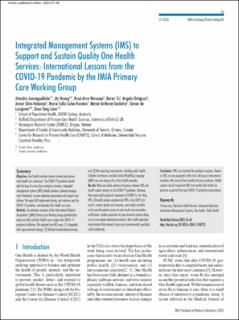| dc.contributor.author | Jonnagaddala, Jitendra | |
| dc.contributor.author | Hoang, Uy | |
| dc.contributor.author | Wensaas, Knut-Arne | |
| dc.contributor.author | Tu, Karen | |
| dc.contributor.author | Ortigoza, Angela | |
| dc.contributor.author | Silva-Valencia, Javier | |
| dc.contributor.author | Cuba-Fuentes, María Sofía | |
| dc.contributor.author | Godinho, Myron Anthony | |
| dc.contributor.author | de Lusignan, Simon | |
| dc.contributor.author | Liaw, Siaw-Teng | |
| dc.date.accessioned | 2024-01-22T13:55:29Z | |
| dc.date.available | 2024-01-22T13:55:29Z | |
| dc.date.created | 2024-01-12T09:22:28Z | |
| dc.date.issued | 2023 | |
| dc.identifier.citation | Yearbook of Medical Informatics. 2023, 32 (1), 55-64. | en_US |
| dc.identifier.issn | 0943-4747 | |
| dc.identifier.uri | https://hdl.handle.net/11250/3113168 | |
| dc.description.abstract | Objectives: One Health considers human, animal and environment health as a continuum. The COVID-19 pandemic started with the leap of a virus from animals to humans. Integrated management systems (IMS) should provide a coherent management framework, to meet reporting requirements and support care delivery. We report IMS deployment during, and retention post the COVID-19 pandemic, and exemplar One Health use cases. Methods: Six volunteer members of the International Medical Association’s (IMIA) Primary Care Working Group provided data about any IMS and One Health use to support the COVID-19 pandemic initiatives. We explored how IMS were: (1) Integrated with organisational strategy; (2) Utilised standardised processes, and (3) Met reporting requirements, including public health. Selected contributors provided Unified Modelling Language (UML) use case diagram for a One Health exemplar. Results: There was weak evidence of synergy between IMS and health system strategy to the COVID-19 pandemic. However, there were rapid pragmatic responses to COVID-19, not citing IMS. All health systems implemented IMS to link COVID test results, vaccine uptake and outcomes, particularly mortality and to provide patients access to test results and vaccination certification. Neither proportion of gross domestic product alone, nor vaccine uptake determined outcome. One Health exemplars demonstrated that animal, human and environmental specialists could collaborate. Conclusions: IMS use improved the pandemic response. However, IMS use was pragmatic rather than utilising an international standard, with some of their benefits lost post-pandemic. Health systems should incorporate IMS that enables One Health approaches as part of their post COVID-19 pandemic preparedness. | en_US |
| dc.language.iso | eng | en_US |
| dc.rights | Attribution-NonCommercial-NoDerivatives 4.0 Internasjonal | * |
| dc.rights.uri | http://creativecommons.org/licenses/by-nc-nd/4.0/deed.no | * |
| dc.title | Integrated Management Systems (IMS) to Support and Sustain Quality One Health Services: International Lessons from the COVID-19 Pandemic by the IMIA Primary Care Working Group | en_US |
| dc.title.alternative | Integrated Management Systems (IMS) to Support and Sustain Quality One Health Services: International Lessons from the COVID-19 Pandemic by the IMIA Primary Care Working Group | en_US |
| dc.type | Peer reviewed | en_US |
| dc.type | Journal article | en_US |
| dc.rights.holder | © 2023. IMIA and Thieme | en_US |
| dc.description.version | publishedVersion | en_US |
| cristin.ispublished | true | |
| cristin.fulltext | original | |
| cristin.qualitycode | 1 | |
| dc.identifier.doi | 10.1055/s-0043-1768725 | |
| dc.identifier.cristin | 2225070 | |
| dc.source.journal | Yearbook of Medical Informatics | en_US |
| dc.source.volume | 32 | en_US |
| dc.source.issue | 1 | en_US |
| dc.source.pagenumber | 55-64 | en_US |

